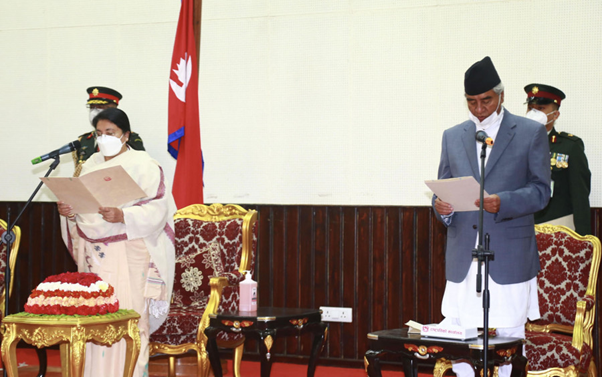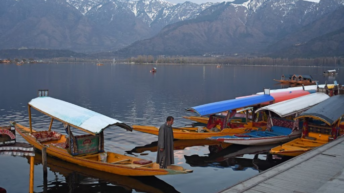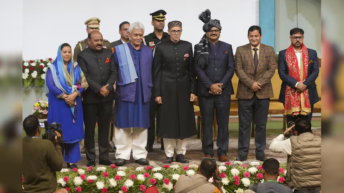|
Listen to article
Getting your Trinity Audio player ready...
|

Picture Courtesy: Kathmandu Post
Ever since the surge of the global pandemic, Nepal has experienced massive turmoil in its domestic politics. In a matter of six months, the parliament was dissolved twice – December 2020 and May 2021. But the Supreme Court (SC) of Nepal has deemed both decisions unconstitutional and overturned the President’s decision to dissolve the house. In another case regarding the name of the erstwhile Nepal Communist Party (NCP), the SC concluded the NCP illegitimate and bifurcated them into their former political avatars – United Marxist-Leninist (UML) and Maoist Centre (MC) led by KP Oli and Pushpa Kamal Dahal, respectively. Also, in a bold verdict that has reset the current political landscape of Nepal, the Constitutional Bench of Nepal’s SC restored the parliament again on 12 July 2021.
Supreme Court reigns Supreme
The Supreme Court directed President Bidhya Devi Bhandari to appoint Sher Bahadur Deuba of the Nepali Congress (NC) as the Prime Minister under Article 76(5) (details below). It ended the tumultuous Oli era which was riddled with the latter’s dictatorial advances. The SC’s verdict may come as a sigh of relief to many Nepali citizens but also portends major challenges for the incumbent, both internal and external. The current situation necessitates the incumbent party to channelize their energy to subdue the negative impact of the pandemic. Concurrently, Nepal will have to also evaluate the political calculations made by both its neighbours and other states.

On 19th July 2020, Prime Minister Deuba won the vote of confidence comfortably with 165 votes. He received support from the Maoist Centre (MC), Janata Samajbadi Party (JSP), Rastriya Janamorcha and some dissents from the Communist Party of Nepal Unified Marxist–Leninist (CPN-UML). NC now has 18 months to govern the country as the current parliamentary term of five years will conclude next year. They will also oversee the next parliamentary elections.
NC was buoyed by the SC’s decision, as the party whip was ineffectual in the recent vote of confidence. This interpretation made by the constitutional bench on article 76(5) helped some UML MPs to cast their vote in favour of Deuba. However, the process was not as easy as the results indicated. Although the task force of UML responsible for placating the differences of the two factions reached a 10-point agreement, tensions were still boiling between Oli and Madhav Nepal. Before the UML task force could reconcile the bickering factions, Deuba sagaciously sought an early floor test amidst UML’s internal hostility. This halted the task force from keeping the dissidents (Madhav Nepal faction) to vote for Deuba.
Had the NC failed to garner the vote of confidence, the house would have been dissolved and elections would have been held within six months. Madhav Nepal faction was morally pressed to vote in favour of a leader to oust Oli. The Oli faction of UML has expressed their bitterness towards the current political reset in the country rendered by the constitutional bench. The challenges for the new Prime Minister will be to keep the ruling coalition together and ensure that the ministers in his grand ruling coalition cohere to his policies and plans for the next 18 months. Maintaining such unity will be a mammoth task as this ruling coalition congregated to oust Oli and does not seem to have planned beyond that.
India’s Options
Last year before the first dissolution of the house the NCP was embroiled in a bitter intra-party dispute. Prachanda and Madhav Kumar Nepal came together to alienate Oli and asked him to give up his position either as the party chairman or parliamentary chief. China sent a high-level delegation led by Guo Yezhou, the vice-minister of the International Department of the CPC (Communist Party of China) to keep the coalition together. However, Oli’s relations with China and the Chinese ambassador started to ebb after the Ambassador tried to maintain the unity of NCP. Oli found an ally in India.
Nepal witnessed a flurry of top Indian government officials arriving in November 2020 – Foreign Secretary Harsh Vardhan Shringla, Indian Army Chief General Mukund Naravane and Research and Analysis Wing Chief Samant Goel. The visit of the latter was critical who met Oli for an unscheduled meeting for more than two hours without the presence of any other officials. Thereon, Oli’s tilt towards India was noticeable. This is reflected in India’s soft stance towards the parliament dissolution. New Delhi noted it as an ‘internal matter’. Recently, Oli even mentioned that the earlier “misunderstandings” with India were resolved while reducing his anti-India rhetoric. Observers had questioned Oli’s inclination towards India and India’s silo engagement with Oli’s UML.
Now that NC is in power till the next parliamentary election, India has a few options to chart out its Nepal policy. First, India can be bitter towards Deuba for ousting their preferred candidate and make life difficult for the new Prime Minister. Deuba was sincerely concerned that this could be the case and expressed this concern to his colleague. This could boost the egos of some of the Indian officials who wanted to see Oli continue as the Prime Minister. However, it will not serve the interests of Nepal or India. Though Deuba might be worried about India’s role, it won’t stop him from publicly calling out foreign interference. A statement issued on 12th June by Deuba along with four other former PMs cautioned against any foreign influence in Nepal’s internal matters.
Second, India can see that Deuba has India-friendly views. He is among those leaders who believe that leading a party and the country is difficult without maintaining good relations with India. Historically, NC and India have shared cordial relations. During the Indian blockade of 2015, NC did not vociferously censure the economic embargo. Therefore, India could engage with Deuba in a constructive manner. India may not have their preferred candidate but Deuba is the next best alternative they could hope for. A day after Deuba won the vote of confidence, he and his counterpart from India, Narendra Modi held a telephonic conversation on bilateral relations and a coordinated effort against Covid-19. This should be seen as a good sign for a prospective healthy relationship between the two countries.
Third, of late in Nepal, it has been viewed that India was backing the unpopular government under Oli. This indicated India’s failure to understand the mood of the Nepali people and the winds of change, though not for the first time. Oli’s anti-India stance during most parts of his tenure then a pendulum shift to a pro-India pose at the eleventh hour should be a reminder to India that it lacks a permanent friend in Nepal’s communist bloc. Nepali leaders’ tilt towards India has waxed and waned as per domestic developments. Instead of playing favourites, India will be best served by engaging all to advance those interests.
Weaker Government, Weaker State?
In either case, India will be dealing with a much weaker government than the one that was formed in 2017. The fluid political scenario led by intra-party fights weakens not only the political parties internally but Nepal’s strength externally. JSP is facing an imminent split, though both factions voted in favour of Deuba. The two factions of CPN (UML) have signed an agreement but the bitterness between the two faction leaders will not abate easily. The gap is further widened as the Oli faction strongly warned the UML representatives not to vote in favour of Deuba, yet 22 members defied him in the recent floor test. The current ruling coalition was united by the desire to oust Oli but share no ideology or political priorities. Hence, there is no ‘glue’ to keep them together for long now that Oli is ousted. Hence, New Delhi will have its work cut out and will have to navigate a fluid political scenario in Nepal.
The SC’s decision may have increased the fluidity. The ruling was clear that individual MPs are no longer bound by party whip when it comes to forming a government under (clause) or for the confidence motion. This helped to give Nepal a government for the next 18 months. Ironically, the SC’s interpretation of Article 76(5) opens an opportunity for foreign entities to influence a small but critical number of MPs when the balance is too close.






Really appericate both of u.